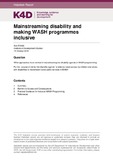| dc.contributor.author | Enfield, Sue | |
| dc.coverage.spatial | Tanzania | en |
| dc.coverage.spatial | Uganda | en |
| dc.coverage.spatial | Ethiopia | en |
| dc.coverage.spatial | Zambia | en |
| dc.date.accessioned | 2019-01-04T13:27:52Z | |
| dc.date.available | 2019-01-04T13:27:52Z | |
| dc.date.issued | 2018-10-15 | |
| dc.identifier.citation | Enfield, S. (2018). Mainstreaming disability and making WASH programmes inclusive. K4D Helpdesk Report. Brighton, UK: Institute of Development Studies. | en |
| dc.identifier.uri | https://opendocs.ids.ac.uk/opendocs/handle/20.500.12413/14229 | |
| dc.description.abstract | This rapid review synthesises evidence and literatures on approaches that have worked in mainstreaming the disability agenda in WASH programming. It begins by exploring the overview of approaches to including disabled people in WASH programming and continues to discuss the barriers to access and consequences. In this section, there are specific and important WASH issues being emphasised including Menstural Hygiene Management (MHM), incontinence, Lymphatic Filariasis and Leprosy and high-density populations. Final section of the review discuss about practical guidance for inclusive WASH programming including the cost of inclusion that needs to be taken into consideration. The review identifies that there is a strong consensus that designing inclusive WASH facilities from the start is the most cost effective approach. Nonetheless, the cost of adapting facilities (retrofitting) costs less than might be expected since cost is often advanced as one reason for not removing barriers. In summary, there is good understanding shown in the literature of the additional difficulties and risks women and girls with disabilities face in accessing WASH facilities. Although men and boys are not immune to violence or attacks, testimonies from women and girls more often report anxieties about their safety and security, which act as an additional barrier to sanitation. The challenges of dealing with menstrual hygiene management are considered. The burden placed upon carers (frequently women) to assist the sick, older people, children with intellectual impairments and others, limits their time for economic activity, forcing families deeper into poverty. | en |
| dc.language.iso | en | en |
| dc.publisher | IDS | en |
| dc.relation.ispartofseries | K4D Helpdesk Report;372 | |
| dc.rights.uri | https://www.nationalarchives.gov.uk/doc/open-government-licence/version/3/ | en |
| dc.subject | Aid | en |
| dc.subject | Children and Youth | en |
| dc.subject | Health | en |
| dc.subject | Population | en |
| dc.subject | Rights | en |
| dc.subject | Social Protection | en |
| dc.subject | Water | en |
| dc.title | Mainstreaming Disability and Making WASH Programmes Inclusive | en |
| dc.type | Other | en |
| dc.rights.holder | © DFID - Crown copyright 2018. | en |
| dcterms.dateAccepted | 2018-10-15 | |
| rioxxterms.funder | Department for International Development, UK Government | en |
| rioxxterms.identifier.project | K4D | en |
| rioxxterms.version | VoR | en |
| rioxxterms.funder.project | 238a9fa4-fe4a-4380-996b-995f33607ba0 | en |

